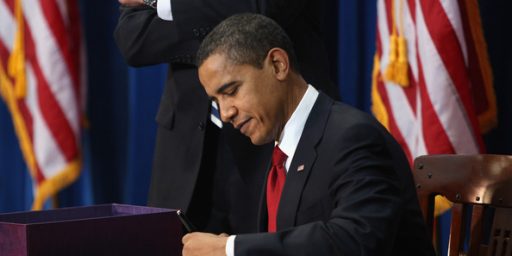An Outside the Box Stimulus Package: Stop Collecting Federal Taxes For Awhile. Period.
Karl Smith does the math and doesn't see why the Federal government should be collecting ANY taxes right now.

Karl Smith wonders why the U.S. Government is even bothering to collect taxes right now, since interest rates are negative, which makes borrowing cheaper than cash right now.
Now do you believe that the real US economy will grow faster than 1.1 percent per year over the next 30 years? We should hope so, because if it doesn’t then lots of our forecasts are going to be waaay off.
Well that means that if we suspend taxation, borrow to fund the government and then keep rolling in the interest payments into the debt, our total obligation as a fraction of the economy will keep falling every year over the 30 year horizon.
Suppose real growth is 3 percent per year. Then this years obligation as a fraction of GDP falls by 1.9 percent per year, every year for 30 years. This means that in 30 years this obligation as a fraction of GDP will be only 56% as large.
Even if we then pay it all off in one lump payment we will only have to increase taxes by 56%. That increases deadweight loss by 146%. However, we saved 100% of deadweight loss in the current period. So our net increase in deadweight loss is only 46%.
Read the whole thing you can see all of Karl’s assumptions and math. I’m sure there’s a reason why this math doesn’t work out. But maybe there isn’t? What if we just suspend tax collection until certain conditions are met, like a certain % yield on ten year bonds for a period longer than X days. Or until the BLS says that unemployment is below a certain threshold. Or a combination of these. I have no idea. I’m not endorsing this proposal. I just find that there’s an insane genius to the logic.
Bottom line: it’s late and I don’t feel like doing in-depth analysis. So I’ll let you guys kick this idea around. What do we say to a temporary suspension of all federal tax collection as a stimulus program?






By not collecting taxes on a government already in deficit, how are we going to pay key personnel like soldiers and the like? How are we going to pay for *anything*? Even our interest and debts? Not to mention the fact that we’re paying unemployment insurance on a lot of that 9.1%. I’m sure a lot of people here would be just happy if those people were summarily executed for being “drains” on the economy, but they have to be considered.
At first glance, I don’t see anything obviously wrong with his analysis (but that doesn’t mean there won’t be problems that deeper analysis won’t reveal). Perhaps he’s on to something?
-Polaris
The government has other sources of revenue besides income taxes. The argument as I understand it anyway is that money is so (artifically) cheap that leaving it in the hands of the people to be collected later gives the better long term return. Of course convincing the credit agencies of this and having the discipline to collect the back-taxes later…..that’s probably where it falls apart. Not because of the math but because of the lack of political will.
Stop taxing and it becomes very hard politically to start taxing again.
-Polaris
My main objection would be political: Once you suspend taxation, resuming it would be labeled as a huge tax-increase by the GOP and hard to do politically (see Bush tax-cuts).
There’s only so much money in the world available to borrow.
America is already consuming over 80% of the world’s savings now just to cover the budget deficit.
I think that the problem may be in “real growth.” When I took econ back in the dark ages, the real growth of the economy was the increase in the GDP minus inflation. When the brain trust (or brain f**t trust depending on your view) says “growth is X” I don’t know that the number they are spouting represents “real growth.” Additionally, the interest is not just on the new debt, the interest we are rolling over includes the interest on the current debt.
Taken together, the math looks to me like the economic version of perpetual motion. So, Alex is right; the math is faulty.
Fabio is exactly right. Grover Norquist’s a** lickers (every elected republican) would never allow taxes to be collected again as that would be a tax increase. Idiocy prevents solutions.
@Hey Norm: This could be a logical lead in to implementing The Fair Tax. Great idea, Alex.
Just don’t call it a stimulus package!
lol
(Google search “I can’t hear the markets but I can smell fear” to find a good piece on low bond yields by [Stephen] King, of all people. At the Financial Times, but googling might let you past the pay gate.)
[oops, the other King: “The writer is chief economist at HSBC and author of Losing Control: The Emerging Threats to Western Prosperity”]
Alex…
“Fair Tax” always strikes me as a Frank Luntzism…in other words it would be anything but fair. To be clear…I’m all for the idea in theory. I just have never been convinced it can work…even if it could be implemented…which it can’t.
Sorry – that should have been directed at Pete…
The most obvious problem with suspension on tax collection is that it destroys demand for the dollar and limits government’s ability to fight inflation. It’s pretty clear Smith has never bothered to ask himself why a populace accepts its government’s fiat currency: after all, it has no intrinsic value, and the answer of every school of economics to this question save one is a tautology. People accept the currency because they accept the currency, they tell us.
In reality the people accept a fiat currency because their government taxes them in that currency. The IRS only accepts payment in U.S. dollars, not Euros or Yen or gold, which requires us to go out and get our hands on a sufficient number of dollars to meet our taxliabilities. This creates a base level of demand and value, so you see taxation for our federal government isn’t really about obtaining revenue at all, not when it can create any quantity of mony it desires at any time. Taxation is about maintaining a stable supply of money.
There’s no reason to do an “in depth” analysis because Smith’s suggestion is so glaringly in error it doesn’t deserve one.
How about having a “tax free” month simular to what many states do – a tax free weekend in August to give parents some relief when buying back to school supplies. No federal taxes at all for one month. This would stimulate the economy with many people buying things that they normally would not buy or put off: iPads, tvs, trips, clothes, movies, concerts, sports tickets, eating out, etc. That is what I would do.
@Racehorse: The middle class is going to save any additional money in the form of a tax cut. This is actually a good thing because they’ll use those savings to retire debt, and that’s the only way out of a balance sheet recession. But it won’t create any jobs or provide much of a stimulatory effect; money used to pay off a debt is destroyed in the process because a loan and liability together net to zero.
That would be a “HUGE” tax cut for the rich, that would be hung on Obama.
There’s something that I think a number of the commenters might think about: we have a fiat currency. That raises all sorts of questions.
– why do we tax as much as we do?
– why do we borrow as much as we do?
– why don’t we change the mix of currency expansion, taxes, and borrowing?
The complaint that just expanding the amount of currency will erode confidence in the currency is quite true but so does borrowing at the level at which we currently are.
@Dave Schuler:
I had a conversation with a guy I considered bright, but a bit too mired in conventional right wing thinking. He talked a lot about imminent inflation, and distrust of the currency. I asked him what I think is the hardest question for those guys: “OK, if your logic is correct, why hasn’t it happened?”
He said it was because the dollar and Treasuries were the least bad alternative. I asked, “how soon can that change?” For the $9T in outstanding Treasuries, there has to be some place for the to go.
So … long answer made short, you ask about confidence, but it important to note that confidence is relative and for the dollar and/or Treasuries to lose, there needs to be a flow to somewhere else.
It’s an imprecise way to say it, but it’s got to be a place that can “hold” trillions. Someplace that can hold NPR’s “Giant Pool of Money.”
(The right wingers I was talking to were very big on us being Greece, any minute. I’d ask why we couldn’t be Japan, and they’d just look at me like they’d never heard of Japan. Must not be in the right wing radio rotation, lol.)
Since I don’t think we have primarily an aggregate demand/cyclical unemployment problem, but have structural problems, I tend to think throwing money at our problems either through conventional spending or tax cuts will not bring us to the promised land of 3% GDP growth.
You can get around the political problem of how much this benefits high earners, by simply targeting the payroll tax, which is far more flat/ slightly regressive. But I’m starting to wonder if this tax is becoming delegitimized, and whether if we keep cutting it, it will be impossible to reinstate, compounding our problems with SS/Medicare.
@Ben Wolf:
In the cold light of my second cup of coffee, I think that this point, exactly, is what was bothering me about Smith’s proposal.
Dave, I don’t think the primary concern of having Ben Wolf write Five Cents in indelible red ink on every dollar is confidence. Its that doctors, lawyers, plumbers, etc. will respond by doubling and redoubling their compensation, while regular people and particularly retirees will wonder why three jobs doesn’t pay what one used to pay.
Ben has a perspective that is self-consistent, but unconventional. I think you really need more than one perspective to get it. Put another way, look at Dave’s questions:
– why do we tax as much as we do?
– why do we borrow as much as we do?
– why don’t we change the mix of currency expansion, taxes, and borrowing?
They amount to a set of nonlinear equations. There are multiple solutions. The solution space is determined by human reactions, world-wide.
@PD Shaw:
FWiW, I think structural problems came first, but aggregate demand problems came second, and are overlaid.
Put another way, no one believes unemployment is all cyclical, or all structural.
These are excellent questions, ones we seem to be avoiding.
@Ben Wolf:
By any reasonable measure, they are questions we are succeeding at. Sure, we have fiscal imbalances, but monetary policy has kept the dollar stable, inflation low, and government credit good.
@john personna:
There’s truth in all this, and the U.S. is not nearly as bad off as it could be right now. But we’ve also failed to adapt our fiscal policies to deal with persistent, widespread unemployment which will remain a drag on our economy for at least a decade. In addition we have a clueless Fed chairman who has publicly admitted he can’t understand why his monetarist policies have had virtually no impact on recovery. Instead of acknowledging his economic model might need some work, he’s decided to double down by continuing to do the same thing and hoping for a different result.
Classical/Monetarist economics are in their paradigmatic death throes, and their replacement by the “unorthodox” schools are inevitable. The question Dave Schuler is effectively asking is, “How much more damage will we let the orthodox schools do before we talk about alternatives?”